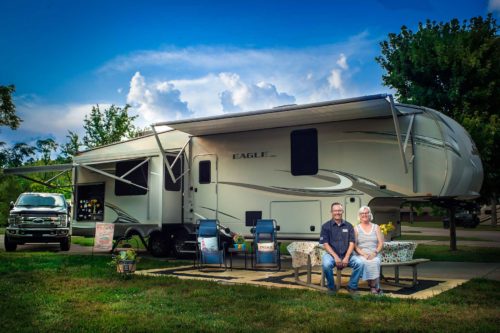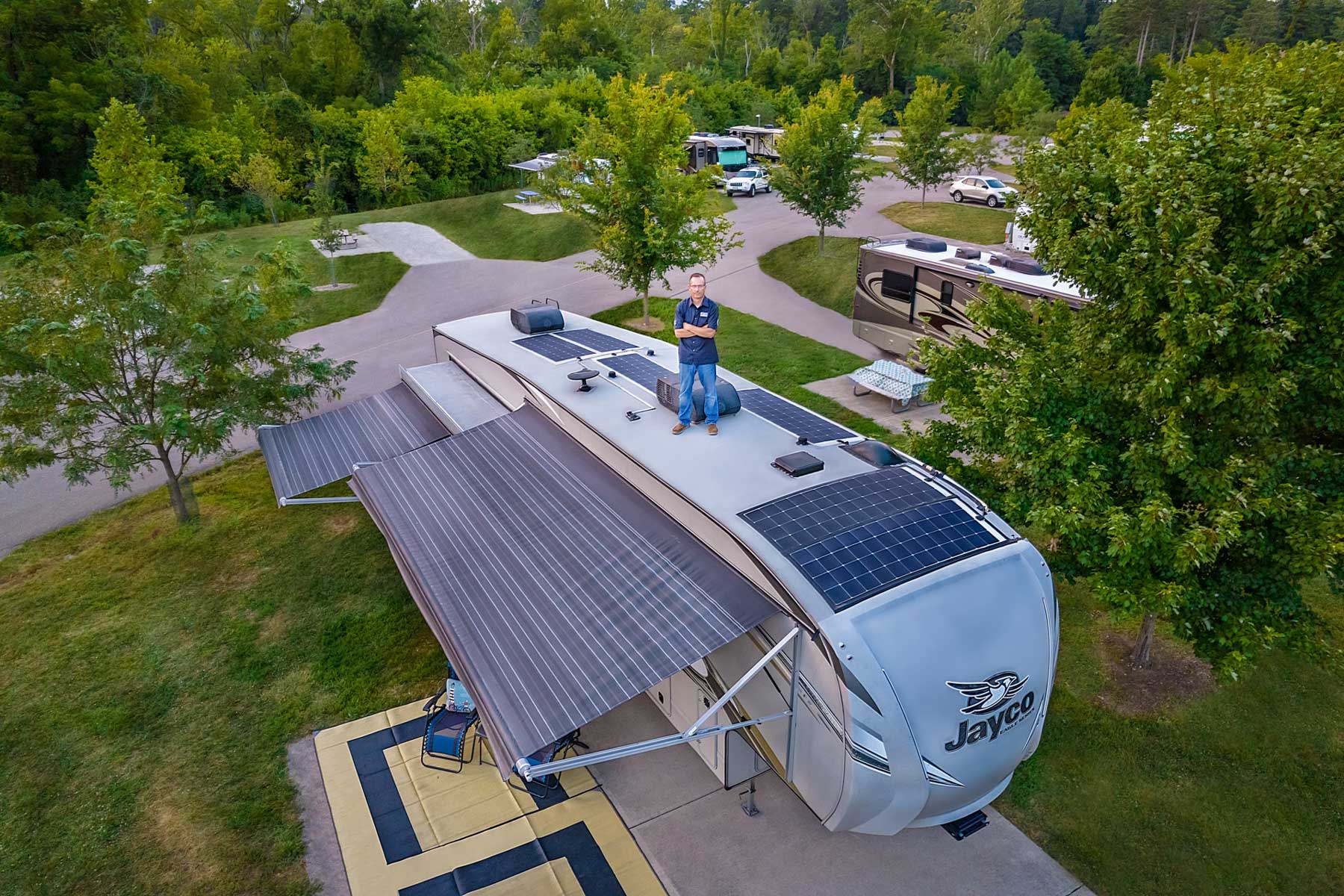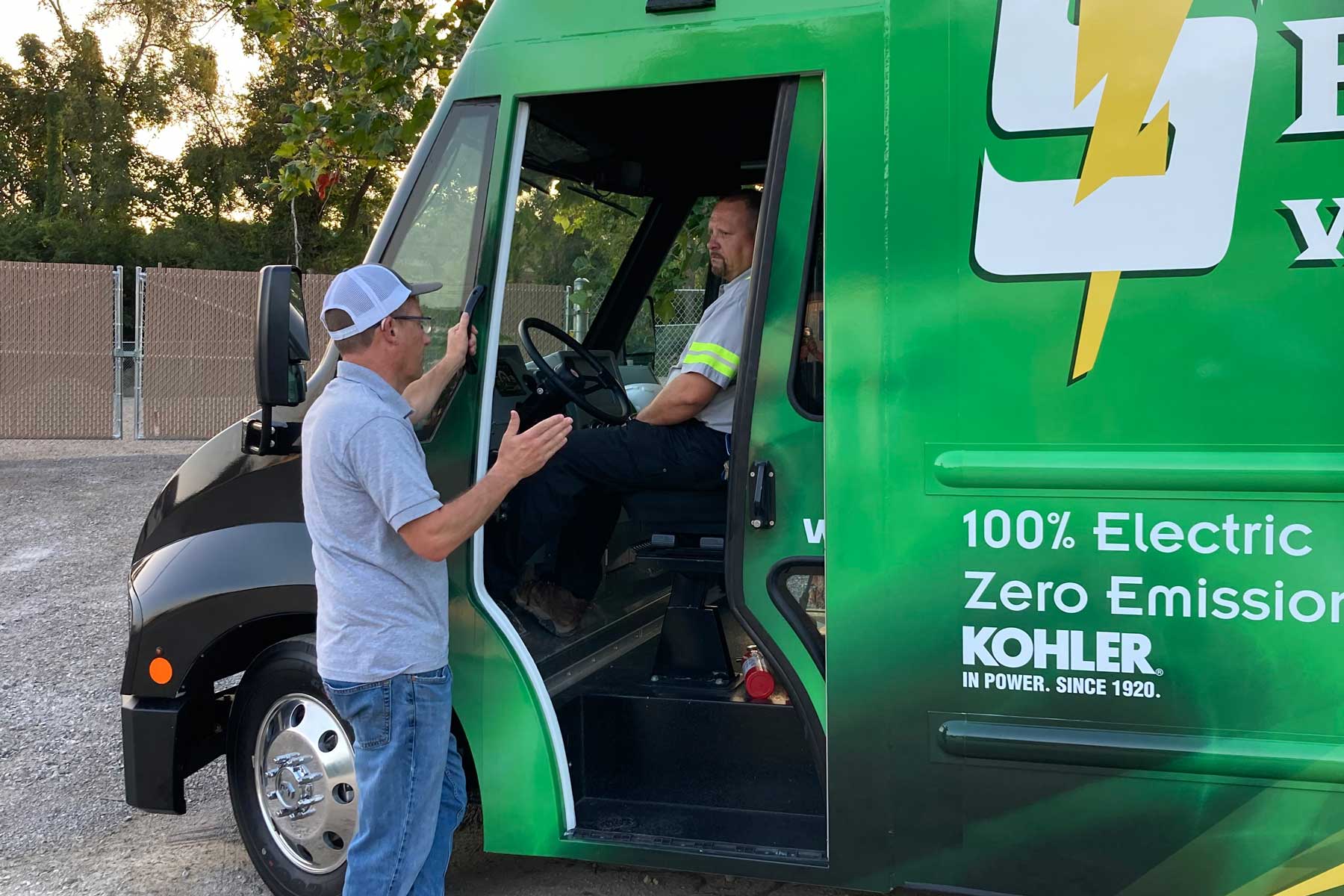
Mike Roeth: Decarbonizing Trucking from the Road
Mike Roeth has clocked thousands of miles pulling his solar-powered recreational vehicle around the country in his quest to make trucking cleaner and more efficient. For some it may seem strange that an effort to curb fuel takes fuel, since Roeth pulls his RV with a diesel-powered Ford F-250.
But for Roeth, executive director of the North American Council for Freight Efficiency (NACFE) and trucking lead for RMI, it makes total sense. Roeth likes to live by the concept of “gemba,” a Japanese word meaning “the actual place.” He learned it in the 1990s while he was managing a plant for a manufacturer of engines and power systems. His plant was implementing a production system similar to Toyota’s, and Roeth was studying the Japanese automaker’s efforts when he discovered gemba.
Gemba means going to see the actual process and learning from those who do the work. Inside a Toyota factory, it means that management walks the floor to observe the manufacturing process up close. In Roeth’s world, it means that he is constantly out on the road, meeting with trucking companies and chatting with truck drivers. His goal is to understand the latest technologies for reducing emissions in a sector that is responsible for 24 percent of transportation’s greenhouse gas footprint.
Roeth grew up on a farm near Dayton, Ohio. He has been around tractors and trucks since he was a toddler. After graduating from Ohio State University with an engineering degree and working with different companies, he eventually became a vice president at Navistar, the company that owns the International brand of trucks and diesel engines. Roeth traveled a lot for work, and when he left Navistar, he decided he wanted to spend more time with his wife, Letty. He told her he would look for a job in Fort Wayne, Indiana, where they were living at the time.
Letty, however, knew her husband better than that. “That’s not you—you have to be traveling and out with people,” she told him. “Why don’t we buy a camper? I’ll go with you and see how we like it.” Roeth became an industry consultant, and they instantly fell in love with working on the road.
Getting the Efficiency Bug
Although Roeth loves working in the trucking industry, he was bothered by the lack of interest in efficiency technologies when fuel prices were low. “I was frustrated to find out that over the past 50 years, when fuel prices went up the industry wanted to lower costs and be more efficient, but when prices went down they didn’t,” he said. As a result, a lot of efficiency technologies were being discarded. “I knew that we need to and can do better with the emissions that move our goods.”
Around the same time that the Roeths were taking to the road, RMI hosted a workshop on efficient trucking with the goal of doubling the efficiency of the trucking sector. NACFE, an independent organization helping to drive efficiency in the trucking sector, was born out of that charrette, and Roeth was the perfect person to take it on.
“The thing I like about trucking is that it’s a small industry: only about half a million trucks are produced in a given year. It forces everyone to work together,” Roeth says. “Even though all the companies have divergent goals, and there’s a very diverse, complex market of trucking, it’s also incredibly collaborative.” That dynamic is ideal for Roeth, who excels at getting people together to work toward a common goal.
“Mike has an incredible resume of experience,” says Amanda Phillips, general manager of OEM (original equipment manufacturer) sales at Meritor, a corporation that makes truck components. “He is always willing to share ideas and teach others. His energy and positive attitude are contagious.” From 2010 to 2016, Roeth nurtured NACFE from a small startup nonprofit to the leading organization on trucking efficiency. According to Phillips, “Mike’s entrepreneurial spirit and his work with NACFE have helped fleets better understand available technologies and the impact those advances can make in their fleet’s carbon footprint.”
During that same time, the Roeths got progressively bigger campers and started being gone more often. They eventually sold their house, got rid of most of their stuff, and became full-time RVers. They now have a 41-foot Jayco Eagle outfitted with a 1.4 kilowatt solar array to run their appliances.

Image: Matthew Chevalier
The Roeths’ next step is to replace both their truck and camper with a motor home that pulls an electric car. Then, when parked at a campsite, they can drive their electric car for shorter trips. They hope to eventually get away from fossil fuels completely with an electric or hydrogen-powered truck that can pull an RV.
The Birth of Run on Less
In 2016, the NACFE team was trying to figure out how efficient a tractor trailer could be if it incorporated the best available efficiency technologies. The team thought the best way to do that was to track some of the most fuel-efficient trucks, driven by efficiency-focused drivers. And with that, Run on Less was born.
The first Run on Less event featured seven fleets, outfitted with different fuel-efficiency measures, in a cross-country demonstration. NACFE followed the fleets across the country and proved that fleets can improve their fuel efficiency by 25 percent if they adopt the right technologies.
The event was so successful that NACFE held a second Run on Less event in 2019. This one included 10 fleets, many very large, focused on regional haul. The second demonstration proved that the 800,000 trucks in North America could decrease their annual consumption of diesel from 8 billion gallons to 5.5 billion gallons, and eventually down to 1 billion gallons.
“Run on Less is just a gift that keeps on giving,” says Roeth. “It’s real, it’s human. We talk to truckers and the people buying trucks and running them, and then we share their stories and data. Do we like it because it’s fun or because the marketplace likes it? I think it’s a bit of both.”
To Roeth, the future of trucking looks bright. He’s most excited about electric and hydrogen trucks. “To think we can move freight with no emissions is incredible,” he says. “Trucking has done a lot. Diesel exhaust is cleaner now. I’m really proud of the industry. But it’s still carbon-based. I’m most excited about moving the industry to zero carbon.”
Roeth is getting an up-close glimpse at a carbon-free future for trucking in the third Run on Less demonstration, called Run on Less – Electric. This event, beginning September 2, features 13 electric trucks in a variety of real-world applications for companies including Frito-Lay, Anheuser-Busch, and Penske.
In addition to new technologies, Roeth is also excited about the changes in terms of diversity that he has seen over the 35 years he’s been involved in the industry. “The meetings I was in 30 years ago were all mostly white men. Now we have women and people of color involved from management to drivers,” he explains.
Living the Gemba Way
While many people took to the road during the COVID pandemic, the Roeths actually stayed put. Part of the joy of being on the road for the Roeths is not only attending industry events, but also going to museums, sporting events, and pubs, and meeting interesting people across the country.

With COVID putting a stop to most of that, they felt they had no reason to go anywhere, so they hunkered down in Indiana. But it wasn’t the same. “During the pandemic I felt I was getting out of touch with trucking,” says Roeth. So he is now back on the road meeting with trucking companies, manufacturers, and drivers.
In the weeks leading up to Run on Less–Electric, he has been traveling around the country visiting most of the 13 companies involved, from Los Angeles to New York City. He has conducted dozens of interviews of fleet managers, company leaders, and truck drivers.
In this way, he learns firsthand about the benefits of electric trucks as well as any challenges the companies have faced. He then uses this knowledge to help increase the use of electric trucks in the industry. After one and a half years of COVID, he is back in his element: observing, listening, learning, and sharing ideas face-to-face. And that’s at the heart of how Roeth tries to live—the gemba way.
Learn about the companies and trucks involved in Run on Less – Electric and follow the Run at https://runonless.com.
Header image courtesy Matthew Chevalier